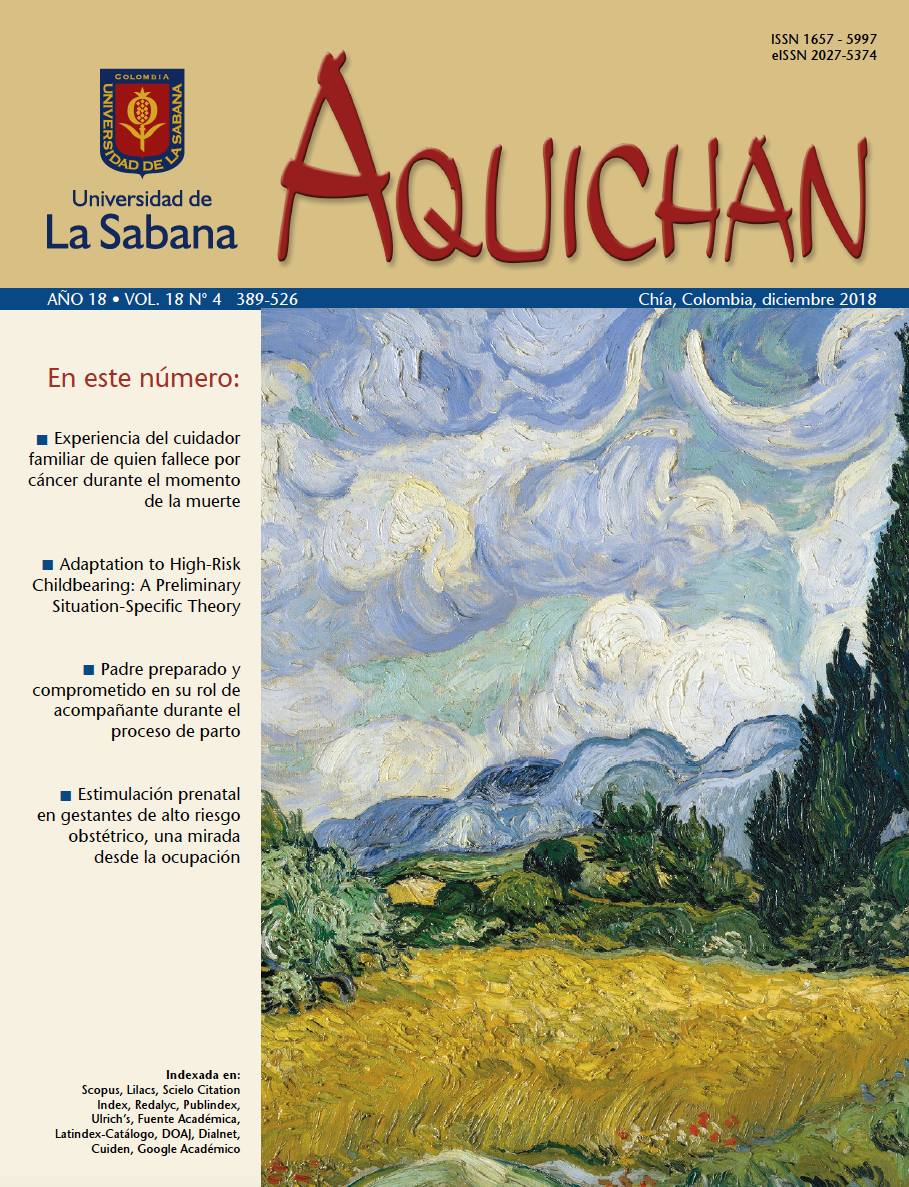Padre preparado y comprometido en su rol de acompañante durante el proceso de parto
DOI:
https://doi.org/10.5294/aqui.2018.18.4.4Keywords:
Prenatal education, childbirth, parturition, fathers, social support, action research, health services researchAbstract
Fathers Prepared For and Committed to Their Role as Companions during the Birth Process
Pai preparado e comprometido em seu papel como acompanhante durante o processo de nascimento
Objective: To identify fathers’ needs in their preparation as a companion to provide emotional support to mothers during childbirth. Materials and methods: An action research project was carried out involving twelve men and their wives. Their educational needs were explored using focus groups and structured interviews during 2015 and 2016. Results: The main emerging themes were “knowing more about the birth process” and “being there with her and for her” as benefits that contribute to the role of a sensitive companion prepared to understand the woman’s needs. Considering one of the major emerging themes, antenatal training for fathers as companions and support during childbirth was developed, implemented and evaluated. Conclusion: It is essential to consider different strategies to strengthen the father’s role by increasing their skills for integration, empowerment and support during birth, and to enhance their satisfaction in meeting the needs felt in a family birth scenario.
Para citar este artículo / To reference this article / Para citar este artigo
Muñoz-Serrano M, Uribe-Torres C, Hoga L. Padre preparado y comprometido en su rol de acompañante durante el proceso de parto. Aquichan. 2018; 18(4): 415-425. DOI: 10.5294/aqui.2018.18.4.4
Downloads
References
Manganiello A, Hoga L. Orgulho de pai: cartilha educativa para promocão do envolvimento paterno na gravidez. USP São Paulo; 2012.
Uribe C, Contreras A, Hoga L. Presencia activa del padre en el nacimiento integral: significados atribuidos por padres y madres a los roles paternos. Rev Chil Obs Ginecol [Internet]. 2018;83(1):22–6. DOI: 10.4067/s0717-75262018000100022
Hoga L, Reberte L, Higashi A, Zamo-Roth F. The experience and role of a companion during normal labor and childbirth : a systematic review of qualitative evidence. Joanna Briggs Inst Database Syst Rev. 2013;11(12):121-56. DOI: 10.11124/jbisrir-2013-1178
Freire P. Pedagogía de la autonomia: saberes necesarios para la práctica educativa. 33.ª ed. Sao Paulo: Paz y Tierra; 2004.
Nakano AM, Silva L, Beleza AC, Stefanello J, Gomes F. O suporte durante o processo de parturição: a visão do acompanhante. Acta Paul Enferm. 2006;20(2):131-7. DOI: 10.1590/S0103-21002007000200004
Premberg A, Lundgren I. Fathers’ experiences of childbirth education. J Perinat Educ. 2006;15(2):21-8. DOI: 10.1624/105812406X107780
Premberg A, Carlsson G, Hellstr A, Berg M. First-time fathers’ experiences of childbirth. A phenomenological study. Midwifery. 2011;27:848-53. DOI: 10.1016/j.midw.2010.09.002
Adeniran AS, Aboyeji AP, Fawole AA. Male partner’s role during pregnancy, labour and delivery: expectations of pregnant women in Nigeria. Int J Heal Sci. 2015;9(3):305-13. Disponible en: https://www.ncbi.nlm.nih.gov/pmc/articles/PMC4633194/
Erlandsson K. Prenatal parental education from the perspective of fathers with experience as primary caregiver immediately following birth: a phenomenographic study. J Perinat Educ. 2010;19(1):19-28. DOI: 10.1624/105812410X481537
Longworth H, Kingdon C. Fathers in the birthroom: What are they expecting and experiencing? A phenomenological study. Midwifery. 2011;27:588-94. DOI: 10.1016/j.midw.2010.06.013
Dolan A, Coe C. Men, masculine identities and childbirth. Sociol Heal Illn. 2011;33(7):1019-34. DOI: 10.1111/j.1467- 9566.2011.01349.x
Espirito-Santo LC do, Lourenzi AB. Expectativas, sentimentos e vivências do pai durante o parto e nascimento de seu filho. Rev Gaúcha Enferm. 2000;21(2):87-109. Disponible en: https://seer.ufrgs.br/RevistaGauchadeEnfermagem/article/view/4330
Aguayo F, Correa P, Cristi P. Encuesta IMAGES Chile. Resultados de la encuesta internacional de masculinidades y equidad de género. 1.ª ed. Santiago de Chile: Besegraf; 2011.
MIDEPLAN. Evaluación y monitoreo del Sistema Integral de Protección a la Infancia Chile Crece Contigo. Santiago Chile: s.e.; 2011.
Melero-Aguilar N. El paradigma crítico y los aportes de la investigación-acción participativa en la transformación de la realidad social: un análisis desde las ciencias sociales. Cuestiones Pedagógicas. 2012;21:339-55. Disponible en: http://hdl.handle.net/11441/12861
Maxwell JA. Qualitative research design: an interactive approach. 3.ª ed. Thousand Oaks, CA: Sage; 2013.
Thiollent M. Metodologia da pesquisa ação. 18.ª ed. São Paulo: Cortez; 2011:19-82.
Fenwick J, Bayes S, Johansson M. A qualitative investigation into the pregnancy experiences and childbirth expectations of Australian fathers-to-be. Sex Reprod Heal [Internet]. 2012;3(1):3-9. DOI: 10.1016/j.srhc.2011.11.001
Hoga L, Reberte L. Pesquisa-ação como estratégia para desenvolver grupo de gestantes: a percepção dos participantes. Rev Esc Enferm USP. 2007;41(4):559-66. DOI: 10.1590/S0080-62342007000400004
Guadagno M, Mackert M, Rochlen A. Improving prenatal health: setting the agenda for increased male involvement. AM J Mens Heal. 2013;7(6):523-6. DOI: 10.1177/1557988313490785
Saxbe D, Horton KT, Tsai AB. The birth experiences questionnaire: a brief measure assessing psychosocial dimensions of childbirth. J Fam Psychol. 2018;32(2):262-8. DOI: 10.1037/fam0000365
Franco MAS. Pedagogía da pesquisa ação. Educ e Pesqui. 2005;31(3):483-502. DOI: 10.1590/S1517-97022005000300011
Abushaikha L, Massah R. The roles of the father during childbirth: the lived experiences of Arab Syrian parents. Health Care Women Int [Internet]. 2011;33(2):168–81. DOI: 10.1080/07399332.2011.610534
Li H, Lin-Koh S, Seow L, He H-G. First-time fathers’ experiences and needs during pregnancy and childbirth: a descriptive qualitative study. Midwifery [Internet]. 2014;30(6):779–87. DOI: 10.1016/j.midw.2013.10.002
Uribe C, Contreras A, Bravo P, Villarroel L, Abarzúa F. Modelo de asistencia integral del parto: concepto de integralidad basado en la calidad y seguridad. Rev Chil Obs Ginecol. 2018;83(3):266-76. DOI: 10.4067/s0717-75262018000300266
Published
How to Cite
Issue
Section
License
1. Proposed Policy for Journals That Offer Open Access
Authors who publish with this journal agree to the following terms:
- The journal and its papers are published with the Creative Commons License Attribution-NonCommercial-NoDerivatives 4.0 International (CC BY-NC-ND 4.0). You are free to share copy and redistribute the material in any medium or format if you: give appropriate credit, provide a link to the license, and indicate if changes were made; don’t use our material for commercial purposes; don’t remix, transform, or build upon the material.









